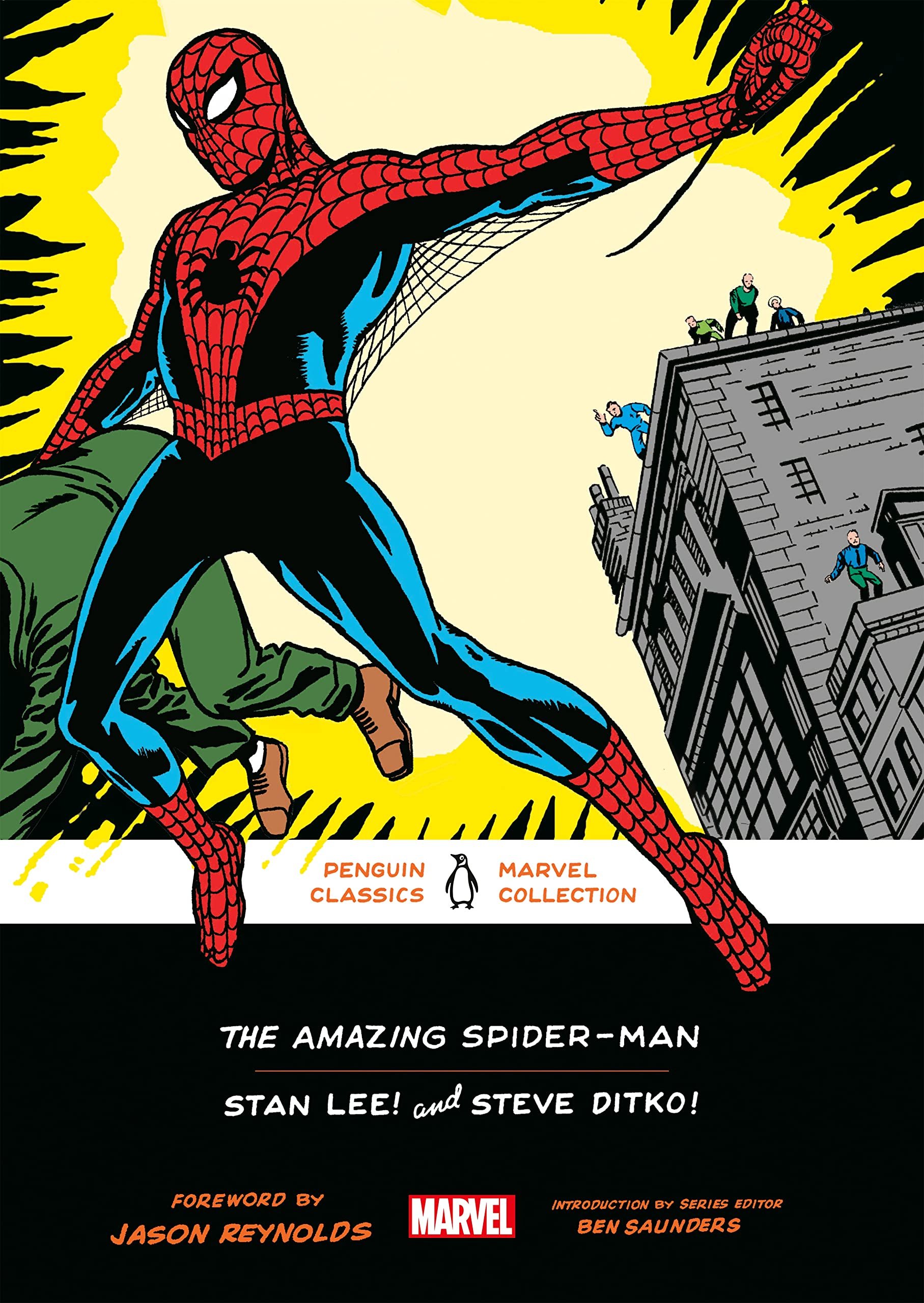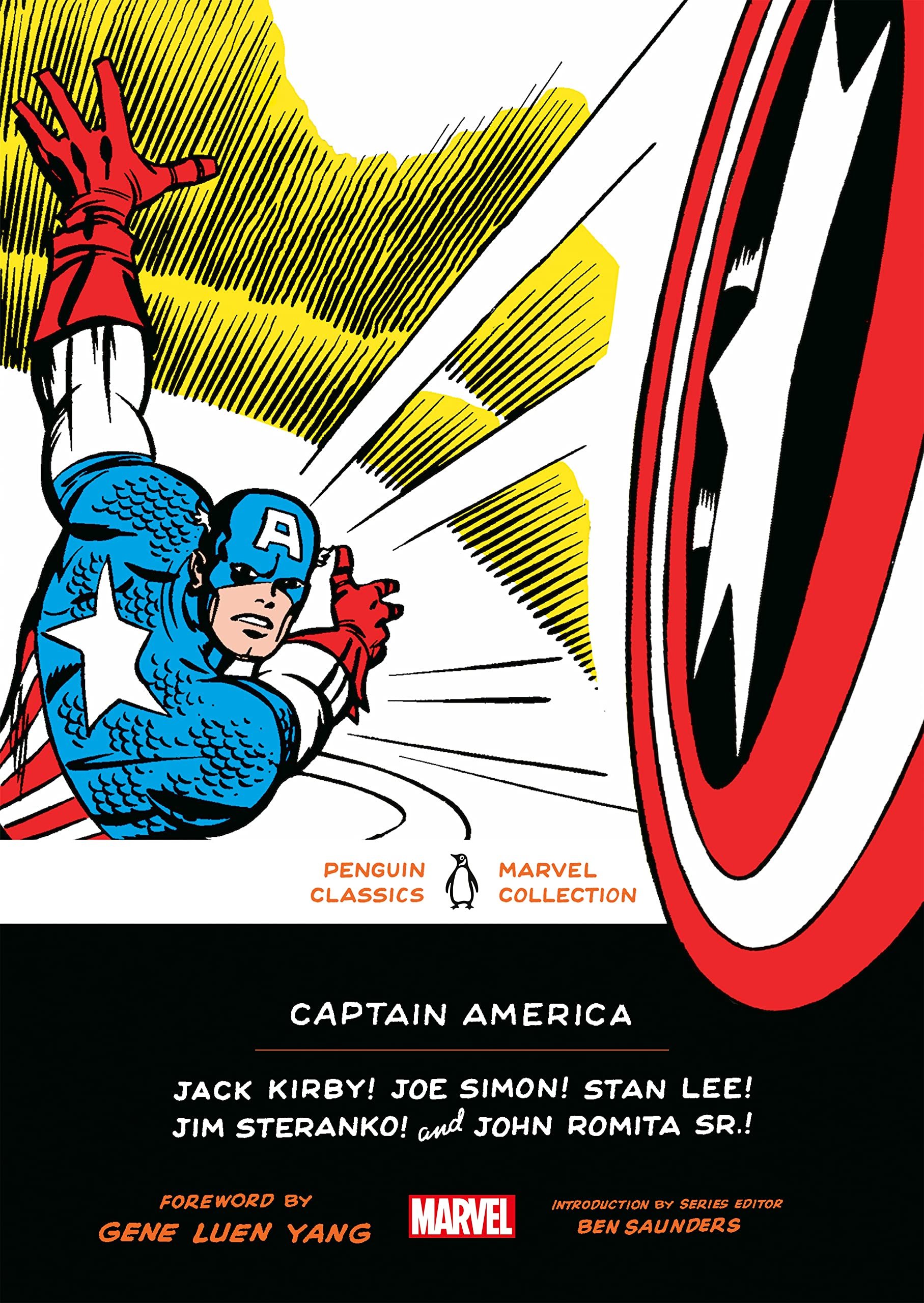Penguin Classics Marvel Comics!
/The Amazing Spider-Man
By Stan Lee & Steve Ditko
Penguin Classics 2022
The Black Panther
By Don McGregor, Billy Graham, Rich Buckler, Stan Lee & Jack Kirby
Penguin Classics 2022
Introduction by Qiana J. Whitted
Captain America
By Stan Lee, Jack Kirby, Joe Simon, Jim Steranko & John Romita Sr.
Penguin Classics 2022
Introduction by Ben Saunders
And there came a day, a day unlike any other …
At long last, by the miracle of some kind of corporate inbreeding, the venerable Penguin Classics reprint line has expanded to include Marvel Comics. Marvel has been reprinting its canonical stories for sixty years, telling and retelling the foundational runs of such iconic characters as the Fantastic Four, the Hulk, the mighty Thor, the X-Men, Spider-Man, and of course the Avengers. And in the last twenty years, many of those stories have been translated to the big screen in an unprecedentedly immense interconnected cinematic universe that’s made billion-dollar properties out of super-teams like the Avengers or lone heroes like King T’Challa, the Black Panther of Wakanda.
In other words, these stories have been a rich and beloved part of the cultural landscape for the better part of a century. Books, written properties of many kinds, have entered the Penguin Classics lineup with far flimsier job histories.
And so, happy readers get these first three oversized full-color volumes reprinting adventures of Spider-Man, Captain America, and the Black Panther. All three of these characters have had their origin stories told and re-told dozens of times, and each of them have featured in many classic storylines, so choosing which comics issues to include in these volumes could have been tricky, but series editor Ben Saunders has managed the task with skill.
Even trickier is the selection of the supporting editorial apparatus for which Penguin Classics is justifiably famous. The natural option would be to put forward some of the current creators on these ongoing titles as natural candidates to write the Forewords and specific Introductions to each volume (Saunders writes the general series introduction). But this presents a nearly unbeatable problem: judging by their interviews, convention comments, and behavior on social media, virtually all of those creators hate heterosexual men (a problem when it comes to Peter Parker), hate the United States (a problem for somebody named Captain America), and most especially they hate white people (not necessarily a problem for the Black Panther, even though the character was created by two Jewish guys from New York City, but possibly a problem for the decidedly non-racist Penguin Classics).
The natural solution to this – pick past and legendary creators on these characters who aren’t brainless ideologues – was not adopted by Penguin; instead, the dangerous route was taken. Which rivets all attention straight on the Black Panther volume, where the “your parents were horrible people” trouble is going to happen if it happens anywhere.
The Introduction is smooth sailing, accurately commenting on the fact that writer Don McGregor’s “Panther’s Rage” run on “Jungle Action” “explored King T’Challa’s life and struggles from the inside out.” And even the Foreword by Nnedi Okorafor isn’t as bad as it easily could have been, merely saying Black Panther comics (some of which she recently wrote) are, in her view, for black people only. “I’ve always viewed Wakanda as a proper return of African Americans (the direct descendants of enslaved Africans during the Transatlantic Slave Trade) to the continent of Africa,” she writes. “There’s a sense of homecoming and belonging in Black Panther that is celebratory. One gets to claim Wakanda as a space to make an African connection.” Openly segregationist, yes, but it could have been worse.
Next up would be Captain America, and again, the worst is neatly avoided. The character was created in 1941 by Jack Kirby and Joe Simon, and that wartime era is represented in this volume, but the bulk of these pages are given over to Stan Lee’s inspired decision to revive the character twenty years later (as Saunders puts it in his Introduction to this volume, “American society was continuing to evolve, and … Captain America had to evolve too, if he hoped to survive”). Although the issue features some showboating later artwork by Jim Steranko, the glory at its heart is the hyper-kinetic artwork of Kirby returning to his old creation. Fans of that creation – or, perish forfend, the nation he represents – are not required to swallow directed insults to their intelligence, morality, or patriotism in order to enjoy the volume. Ta-Nehisi Coates must be spinning in his grave.
After such potential hurdles, Spider-Man is comparatively small potatoes. These are the seminal introductory issues drawn by Steve Ditko, and the Introduction winningly points out that although Spider-Man’s various technology-oriented foes might be intimidating (as is the progress of technology itself), they also suggest that “with the right combination of bravery and ingenuity, those same terrors can be overcome.”
So: the inaugural Penguin experiment with “Marvel’s reinvention of the super hero comic book” is a near-complete success. True, Saunders can’t resist larding on some teacher’s lounge bloviation like “These creators expanded the emotional and aesthetic horizons of an entire genre of fantasy in ways that continue to reverberate across the popular culture of the twenty-first century.” But when an incredibly respectable publishing imprint like Penguin takes a flyer on actual comic books, some amount of slightly insecure throat-clearing is probably inevitable. The important thing is that these three volumes were crafted from top to bottom with intelligence, sensitivity, and obvious love.
Long may the experiment continue! Let’s do a super-team trio next time: the X-Men, the Avengers, and of course the one shameful omission from this first batch, the Fantastic Four, who kicked off the modern era of comics back in 1961.
-Steve Donoghue is a founding editor of Open Letters Monthly. His book criticism has appeared in The Washington Post, The American Conservative, The Spectator, The Wall Street Journal, The National, and the Daily Star. He writes regularly for The Boston Globe, the Vineyard Gazette, and the Christian Science Monitor. He’s a books columnist for the Bedford Times Press and the Books editor of Big Canoe News in Georgia, and his website is http://www.stevedonoghue.com.


